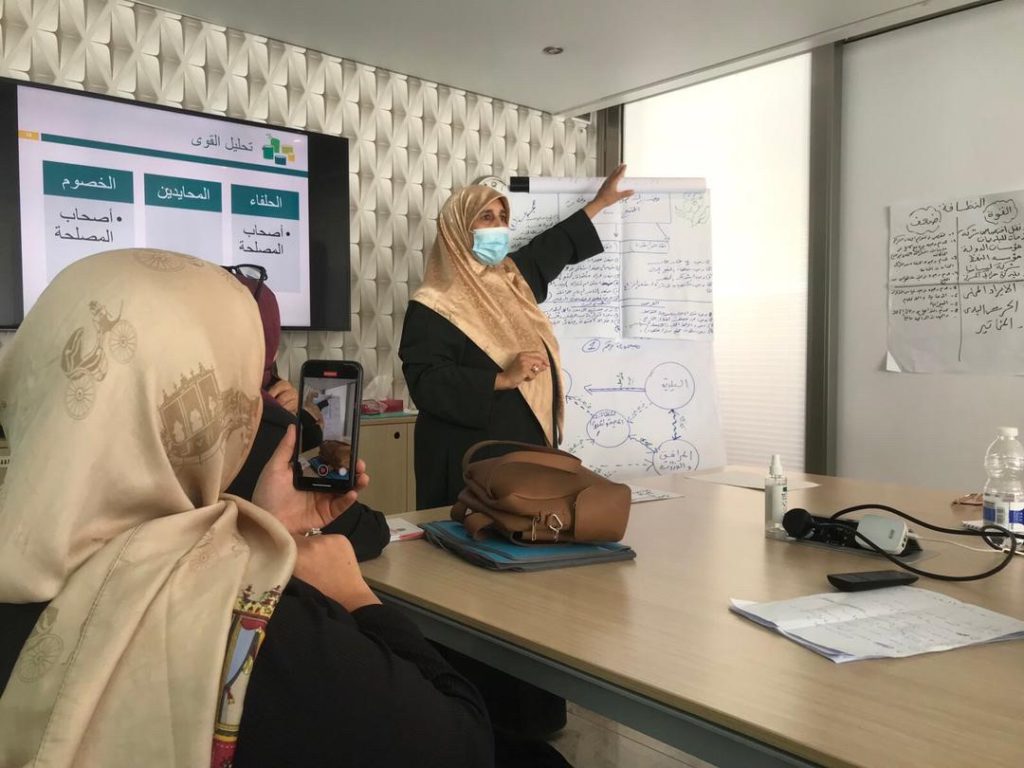Sumaya Abushagour, a civil society activist and founding member of the Tripoli Centre Social Peace Partnership (established in 2017) became passionate about working with marginalised groups (such as women, youth and people living with disability), when employed by the Ministry of Education and the Tripoli Centre Municipality, Social Affairs Unit. As a member of the Tripoli Centre Social Peace Partnership, Sumaya further developed her valuable network of contacts – and benefitted from the mentoring and skills training provided in Social Peace and Local Development (with support from PCi) that added to her experience and encouraged her to continue to support women, youth and people living with disability in the community. She was recently appointed to the position of Mukhtar al Mahalla (Head of Locality) in the Omar al-Mukhtar neighbourhood within Tripoli Centre; she is the first woman in Libya to be appointed to this position.
Through the Tripoli Centre Social Peace Partnership, Sumaya works to raise awareness in the community, to shift social perceptions about women’s abilities and contributions in society. In Libya, social norms and perceptions around gender roles are a key barrier to women’s empowerment and women are often excluded from livelihood and economic regeneration projects. Specifically, Sumaya arranged vocational trainings in sewing, cooking, and nursing for over sixty women across Tripoli; she also mentored young women who aspire to leadership positions in the community. An inspirational role model, Sumaya said: “Through the Social Peace Partnership, I have spoken to many young women in Tripoli who expressed their dream of being appointed to a leadership position – but they don’t know how to go about this and are often very afraid of how society will perceive them.”

workshop with the Tripoli Centre Social Peace Partnership
Abdul Salam Ben Saoud, is the Tripoli Social Peace Partnership coordinator, working closely with the Municipal Council. He says that Sumaya has the vision and skills to be appointed Mukhtar al Mahalla (Head of Locality), noting her track record in delivering vocational training to women – and the production of a plan to repair and revive one of Tripoli’s busiest commercial streets damaged by the conflict.
Sumaya is currently working to deliver vocational trainings for women and youth, involving a collaboration between the Tripoli Centre Social Peace Partnership and the Omar al-Mukhtar neighbourhood. Sumaya said: “Youth unemployment and the financial dependence of women on men are two main challenges faced by our community. It is important that we give youth and women the space to find their talents and be able to earn an income, use their time wisely, and be good role models for future generations, as we work on breaking stereotypes and building a peaceful and prosperous Libya with equal chances for all! We are also working on activities for people with disabilities, as they too have a crucial role in our society and deserve to be represented.”
Sumaya is also working with the local Municipality to identify community priorities. There is an urgent need to repair the power station that provides electricity to her neighbourhood, recently damaged by heavy rain and flooding. She has sent her report to the Ministry of Electricity and the Tripoli Municipal Council, with whom she has good working relationships. The Mayor of Tripoli Centre, Ibrahim Al-Khalifi (interviewed by Alhadath TV1), recently commented on Sumaya’s appointment to Head of Locality: “Sumaya is hardworking, competent and an educated woman who meets the requirements for Head of Locality; she also obtained one of the highest grades in the relevant exam.”
For more on the Libya Social Peace and Local Development (SPLD) programme, click here.
+++++++++++++++++++++++++++++++++++++++
In Libya, PCi supports women’s inclusion through four pillars:
Leadership
- Provide space and opportunities for women to strengthen and practice leadership skills
- Fund and support women-led initiatives
- Facilitate knowledge sharing, peer support and mentoring of young women
Participation
- Ensure women feel confident and safe to speak freely and participate meaningfully
- Work with men to behave as allies and advocate for women’s inclusion
- Ensure women’s interests and needs are considered in decision making
Representation
- Ensure at least 30 per cent female membership in Social Peace Partnerships and gender-balanced participation across programme activities
- Include representatives of women’s diverse social groups
- Support female representatives through training and coaching
Visibility
- Support communication strategies and media campaigns that amplify the voices of women leaders
- Facilitate networking among women leaders in different regions and sectors
- Support role models with diverse social backgrounds
